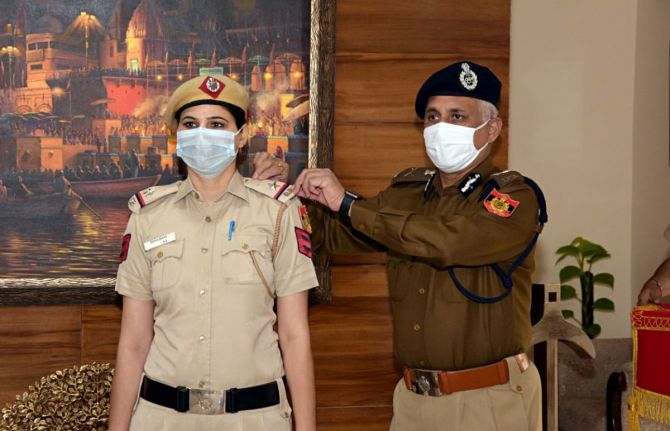
Delhi policewoman Seema Dhaka was given an out of turn promotion, appointed assistant sub-inspector and felicitated by Delhi Police Commissioner Sachidanand Shrivastav.
What she had accomplished was something extraordinary.
In August, Commissioner Shrivastav announced out of turn promotions for any constable or head constable who rescued 50 or more missing children below the age of 14, including 15 of them less than 8 years old, within 12 months.
"I traced 76 children within two-and-a-half months," Assistant Sub Inspector Seema Dhaka tells A Ganesh Nadar/Rediff.com.
"It took me another 15 days to prepare the file," she adds, "Out of the 76 children, 56 were below the age of 14 and 20 were older."
ASI Dhaka, an arts graduate, joined the Delhi police in 2006 as a constable. In 2014 she was promoted to head constable after clearing an internal exam. Married to a policeman, the couple have an eight-year-old son.
"I traced the first child on August 12 and the 76th child on October 26."
In her quest for tracing the missing children she travelled to Punjab, UP, Gurgaon, Noida and West Bengal.
In Bengal she had to cross two rivers by boat to find a missing child. The Bengal police, she adds, were very helpful in tracing the missing child.
Talking about a 15-year-old child she traced, ASI Dhaka reveals, "The girl was married with two children when I found her. I brought her back to her parents with the children, and the man who married her has been arrested."
ASI Dhaka is currently posted at the Samaypur Badli police station in the Delhi police commissionerate's Outer North district.
"I volunteered to be part of the missing children division because I felt that I could make a difference and find the children," she says.
She had one constable to assist her at all times. "I could ask for more police support if there was a need for any particular case," she says.
She mentions a young boy she rescued who did not want to go home as his stepfather beat him.
ASI Dhaka declines to share how she tracked down the children, insisting that investigative police work cannot be discussed with the media.
Some girls went missing because of romantic interests, she says. Then there were boys who became drug addicts and starting stealing to support their drug habits. These were some of the children back home.
ASI Dhaka says the joy she sees on the parents's faces when she takes the children home is eward enough.
After her investigation, ASI Dhaka has returned to regular police work. "I am now planning to take a holiday as I worked very hard the last few months."
"I am also feeling good about the work I have accomplished."











